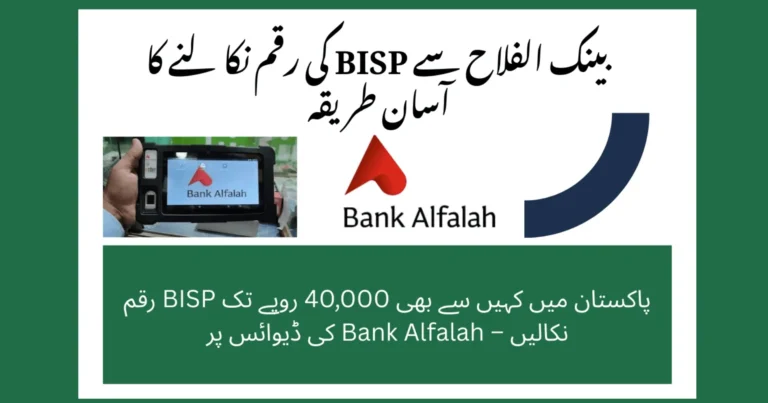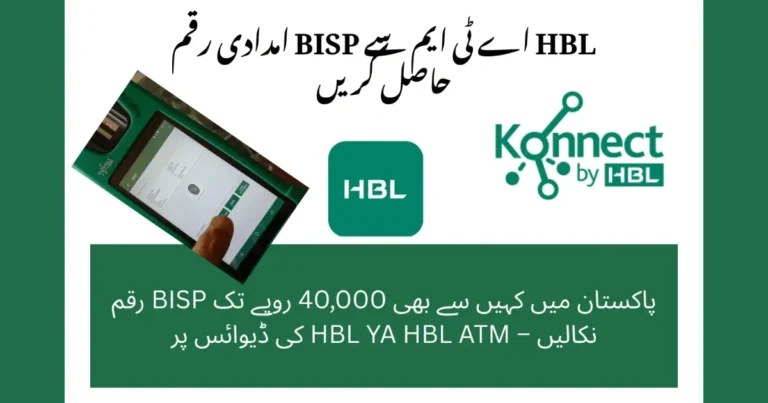Top 5 Reasons Why Women Are Being Disqualified from BISP Rs. 13,500 Payments (2025 Guide)
Are you worried about losing your Benazir Kafalat stipend of Rs. 13,500? You’re not alone. Thousands of women across Pakistan are facing disqualification from the Benazir Income Support Programme (BISP) under the latest verification system launched in 2025. Whether you are already receiving payments or newly registered, this update is crucial for you.
As part of the 2025 reforms, BISP has started a nationwide disqualification process to ensure fair distribution of funds and eliminate ineligible beneficiaries. The system now automatically matches your CNIC with bank records, microfinance loans, and national databases. If any mismatch, loan default, or ineligibility is detected your quarterly payment may be suspended without any prior notice.
This step-by-step guide explains the top 5 reasons why women are being disqualified, how the BISP 2025 verification system works, and what you can do to restore your payments if you’ve been affected.
🟢 Check your CNIC status now through the official 8171 CNIC Verification BISP Payment portal to avoid payment delays.
🔴 BISP Disqualification Policy 2025: What You Need to Know
With the introduction of the new BISP policy in 2025, thousands of families have been disqualified due to updated eligibility criteria and digital verification measures. If you’re a woman receiving the Benazir Kafalat Rs. 13,500 quarterly payment and have suddenly stopped receiving it, this guide will help you understand why.
| DISQUALIFICATION REASON | DETAILED EXPLANATION | AFFECTED GROUPS | PREVENTION MEASURES |
|---|---|---|---|
|
REASON 1 Unpaid Loans or Microfinance Defaults Financial Institution Records |
If you have borrowed money from any microfinance institution, bank, or mobile loan app and failed to repay it, your BISP payments may be automatically blocked. The system now cross-references all financial databases. |
• Microfinance borrowers • Bank loan defaulters • Mobile app loan users • Credit card defaulters • Installment payment failures |
✅ Avoid taking loans you can’t repay ✅ Clear existing debts promptly ✅ Maintain good credit history ✅ Keep payment records safe |
|
REASON 2 Incorrect or Missing Information Data Verification Issues |
Providing wrong CNIC data, family income, or household details during registration or surveys can instantly disqualify you. The new system has zero tolerance for inconsistencies. |
• Wrong CNIC information • Incorrect family size • False income declarations • Outdated contact details • Inconsistent survey responses |
✅ Always provide accurate information ✅ Update details when they change ✅ Double-check all forms ✅ Keep documents consistent |
|
REASON 3 Foreign Travel or Hajj/Umrah International Movement Tracking |
Recent international travel—especially for leisure, Hajj, or Umrah—is now being considered a sign of financial stability. It may lead to removal from the beneficiary list. |
• Recent international travelers • Hajj/Umrah performers • Leisure trip takers • Business travelers • Family visit abroad |
✅ Report travel if required ✅ Explain travel circumstances ✅ Provide financial justification ✅ Keep travel documentation |
|
REASON 4 Expired CNIC Not Renewed Document Validity Issues |
If your CNIC has expired and you haven’t updated it with NADRA, your BISP stipend will be paused until renewal and re-verification. This is now strictly enforced. |
• Expired CNIC holders • Delayed renewal cases • NADRA verification pending • Document processing delays • Biometric update required |
✅ Renew CNIC before expiry ✅ Update biometric data regularly ✅ Keep NADRA records current ✅ Monitor expiry dates closely |
|
REASON 5 Fake Documents or Identity Use Fraudulent Activity Detection |
Those who submitted forged income proofs, incorrect family size, or used someone else’s CNIC during enrollment are being permanently disqualified. Advanced verification systems now detect fraud easily. |
• Fake document submitters • Identity theft cases • False income proof providers • Incorrect family size reporters • Multiple registration attempts |
✅ Always use genuine documents ✅ Submit only your own CNIC ✅ Provide accurate family details ✅ Avoid fraudulent practices |
These changes primarily affect female beneficiaries who: Took a loan and missed repayment deadlines • Shared false or outdated information in their dynamic surveys • Traveled abroad recently or purchased new assets • Registered with another person’s CNIC or fake documents
| BISP BACHAT SCHEME 2025 | SYSTEM FEATURES | CONNECTED DATABASES | IMPACT ON BENEFICIARIES |
|---|---|---|---|
|
NEW SYSTEM Automated Verification Real-time Monitoring |
To increase efficiency and transparency, BISP introduced the Bachat Scheme 2025. This system connects your CNIC with all financial databases for real-time verification. |
• All microloan providers • Bank records • Mobile lending platforms • Government databases • Asset registration systems |
✅ Real-time accuracy ✅ Eliminates manual errors ✅ Prevents corruption ❌ Automatic suspension for defaults |
|
PROCESS Automatic Suspension No Manual Override |
Once a loan default is flagged, the system automatically suspends your payment—no field verification is required. Even BISP officers cannot override this unless the loan is cleared. |
• Instant database matching • Automated flag generation • System-wide suspension • No manual intervention • Clearance requirement |
⚠️ Immediate payment stoppage ⚠️ No advance warning ⚠️ Officer cannot help ✅ Must clear debt first |
| RECOVERY STEP | DETAILED PROCESS | REQUIRED DOCUMENTS | EXPECTED TIMELINE |
|---|---|---|---|
|
STEP 1 Repay Your Loan Clear Outstanding Balance |
Clear your outstanding balance either in full or through approved installments. Contact your lender to negotiate payment terms if needed. |
• Loan agreement copy • Outstanding balance statement • Payment plan agreement • Contact lender details • Financial capability proof |
⏱️ 1-30 days depending on amount ⏱️ Installment plans available ⏱️ Immediate for small amounts ⏱️ Negotiation time varies |
|
STEP 2 Get Proof Obtain Repayment Evidence |
Obtain a valid proof of repayment—bank letter, SMS confirmation, or official receipt. Ensure it’s on official letterhead with proper stamps. |
• Bank clearance letter • Official payment receipt • SMS confirmation copy • Lender clearance certificate • Transaction proof |
⏱️ 1-7 days for documentation ⏱️ Same day for digital proof ⏱️ Bank letters take 2-3 days ⏱️ Official stamps required |
|
STEP 3 Visit Tehsil Office Submit Documentation |
Take your CNIC and repayment proof to the nearest BISP Tehsil Office. Speak with the designated officer for record updates. |
• Original CNIC • Repayment proof documents • Previous BISP payment slips • Contact information • Application for restoration |
⏱️ Office visit: 1-2 hours ⏱️ Document verification: Same day ⏱️ Queue waiting time varies ⏱️ Officer meeting: 15-30 minutes |
|
STEP 4 Request Record Update System Status Change |
Ask BISP staff to update your payment status in their system. They will verify your documents and process the restoration request. |
• Completed restoration form • Verified repayment proof • Updated contact details • Officer recommendation • System update request |
⏱️ Form processing: 30 minutes ⏱️ System update: 1-3 days ⏱️ Verification: 2-5 days ⏱️ Status reflection: 1 week |
|
STEP 5 Complete Dynamic Survey If Required |
If required, fill out a new survey with accurate information and documentation. This ensures your eligibility is properly assessed. |
• Updated household information • Current income proof • Family composition details • Asset declaration • Accurate contact information |
⏱️ Survey completion: 1-2 hours ⏱️ Document collection: 1-3 days ⏱️ Verification process: 1-2 weeks ⏱️ Final approval: 2-4 weeks |
To stay in the BISP Benazir Kafalat Program and continue receiving the Rs. 13,500 stipend, you must: Keep your CNIC valid and updated • Avoid taking loans you can’t repay • Never submit false data or documents • Regularly check your BISP status through the 8171 Web Portal or SMS service
| ESSENTIAL TIPS | IMPLEMENTATION GUIDE | DOCUMENTATION NEEDED | LONG-TERM BENEFITS |
|---|---|---|---|
|
TIP 1 Keep CNIC Valid Document Management |
Keep your CNIC valid and updated. Monitor expiry dates and renew well in advance to avoid payment interruptions. |
• Current CNIC copy • Renewal application • Biometric verification • Address proof • Fee payment receipt |
✅ Uninterrupted payments ✅ Smooth verification process ✅ No document-related delays ✅ Maintained eligibility status |
|
TIP 2 Avoid Unpayable Loans Financial Discipline |
Avoid taking loans you can’t repay. Calculate your repayment capacity before borrowing from any source. |
• Income calculation sheet • Monthly expense record • Repayment capacity analysis • Emergency fund planning • Financial advice consultation |
✅ No payment suspensions ✅ Good credit history ✅ Financial stability ✅ Continued BISP eligibility |
|
TIP 3 Submit Accurate Data Information Integrity |
Never submit false data or documents. Always provide accurate, verifiable information in all applications and surveys. |
• Genuine income proof • Accurate family details • Correct asset information • Verified contact details • Consistent documentation |
✅ No fraud-related disqualification ✅ Smooth verification process ✅ Maintained program trust ✅ Long-term eligibility |
|
TIP 4 Regular Status Checks Monitoring System |
Regularly check your BISP status through the 8171 Web Portal or SMS service. Stay informed about your payment status and any issues. |
• Active mobile phone • Internet access for portal • CNIC number ready • Regular checking schedule • Issue tracking system |
✅ Early problem detection ✅ Timely issue resolution ✅ Payment schedule awareness ✅ Proactive management |
|
TIP 5 Document Preservation Record Keeping |
Always keep a copy of all your documents, loan payment proofs, and CNIC receipts to avoid delays in requalification. |
• Document copies • Payment receipts • CNIC renewal records • Communication records • Safe storage system |
✅ Quick requalification process ✅ No document recreation delays ✅ Proof of compliance ✅ Smooth restoration process |







